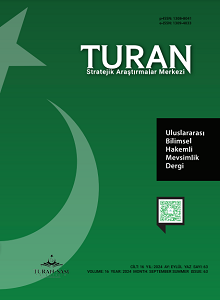“HÜKÜM YALNIZCA ALLAH’A AİTTİR.” AYETİNİN BAĞLAMI
"THE JUDGMENT BELONGS TO ALLAH ALONE.” THE CONTEXT OF THE VERSE
Author(s): Bayram MaraşliSubject(s): Islam studies, Sociology of Religion, Qur’anic studies
Published by: Sage Yayınları
Keywords: Judgement; Context; Purpose; Significance; Common wording;
Summary/Abstract: The best way to understand a text is to best understand the author's intention. If the author is a divine being, this will of course not be like understanding an ordinary author. However, it is not impossible in any way. Because the Word is meant to be understood. Otherwise it is not only unreasonable but also absurd. There was no problem in understanding the Quran when the Prophet was alive. Both the revelation of the verses on the events and the fact that the addressees were in the "scenario" was eliminating many difficulties in understanding. The fact that the verses were revealed upon the events and that the interlocutors were in the "scenario" were eliminating many difficulties in understanding. Beyond all this, the fact that the Prophet was alive and was the only authority prevented the verses from being understood in different ways. With the death of the Prophet, conflicts arose and the texts became the subject of interpretation in different ways. Many verses that were not subject to discussion when the Prophet was alive; social-political conflicts, some doctrinal problems, problems that arise when different cultures become Muslims, etc. issues have been brought to the agenda and become a matter of discussion. Some of these verses remained in the pages of history and some of them have come up again now and then. One of the verses that comes to the agenda again is the verse of judgment. This etc. Many factors can be considered in taking the verses out of context. The most important of these factors can be considered procedural problems. Many factors can be considered in taking these and similar verses out of context. Method problems can be placed at the top of these factors. Because the method of tafsir and fiqh, which is a method of understanding the verses and making judgments, has put forth some arguments that can be considered problematic or at least can be discussed. There is no consensus on these arguments and they have been discussed for a long time. These arguments shook the verses to its foundations and led to verses to be interpreted in different ways. On the other hand the interpretation of some verses as meaning that anything can be inferred from the Quran has led the verses to different channels than their context and from time to time, it has caused the discourses that the Quran opposes to be put forward as if they were the Quran's own argument. The apparent signification of the verses, which are widely accepted in our tradition, have caused the apparent meaning of many verses and the purpose of the verse to be ignored. Undoubtedly, in our tradition, these method rules have not been imposed with malicious intent and judgements have not been issued with malicious intent. Because those who cling to the apparent meaning of the verses have been condemned and it has been preferred to protect the purposes of the verses. However, it cannot be said that the parties in conflicts between sects did not cling to the apparent by ignoring the purpose of the verses from time to time. Unfortunately, the problems experienced today within the framework of the verses of judgment arise from taking the verses out of context and reading them apparently by ignoring their purpose. Of course it cannot be said that the problem arises solely from methodical mistakes. Because the sociopolitical environment and even psychological conditions have a great impact behind such approaches. Especially considering the geographies where such problems occur, the social and spiritual dimension of the situation will not be overlooked. However, in this article the context of the judgement verses has been examined within the framework of methodical problems. First of all, some methodical problems in understanding the verses areput forth and then the etymology of the judgment word is briefly mentioned and the context of the verses is presented transparently.
Journal: TURAN-SAM
- Issue Year: 16/2024
- Issue No: 63
- Page Range: 275-287
- Page Count: 13
- Language: Turkish

